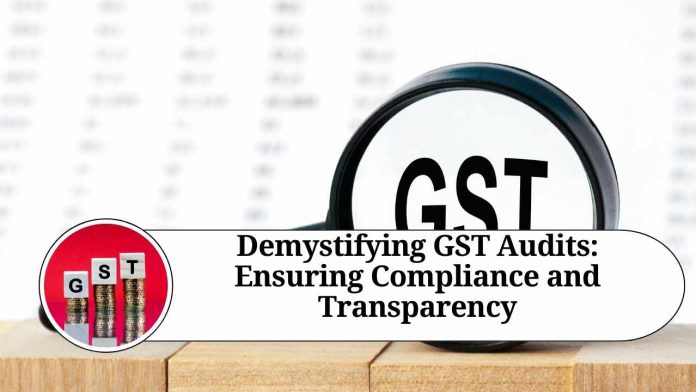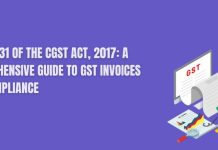The introduction of the Goods and Services Tax (GST) system revolutionized the Indian tax landscape, streamlining the complexities of multiple indirect taxes and fostering economic growth. As businesses adapt to the GST regime, one critical aspect that requires attention is the process of GST audits. In this blog, we will explore the concept of GST audits, their significance, and how businesses can ensure compliance and transparency while undergoing these audits.
- Understanding GST Audits: A GST audit is an examination of a taxpayer’s records, books, accounts, and returns to verify the accuracy of reported information. The audit ensures that businesses are complying with GST laws, maintaining proper documentation, and accurately disclosing their financial transactions. The audit is conducted by authorized GST officers or chartered accountants appointed by the taxpayer.
- Types of GST Audits: Under the GST regime, there are three types of audits: a) Mandatory Audit: Businesses with an annual aggregate turnover above a specified threshold (currently Rs. 5 crores) are required to undergo a mandatory audit conducted by a chartered accountant or a cost accountant. b) Special Audit: If deemed necessary, the Commissioner of GST can order a special audit to be conducted by a chartered accountant or a cost accountant when there are complex transactions or discrepancies in the taxpayer’s records. c) Departmental Audit: GST officers can conduct audits at their discretion to ensure compliance with GST provisions and investigate suspected cases of tax evasion or non-compliance.
- Significance of GST Audits: GST audits play a crucial role in promoting transparency, deterring tax evasion, and ensuring the accuracy of financial reporting. They assure the government, taxpayers, and other stakeholders that businesses are complying with GST laws, thereby maintaining a fair and level playing field. GST audits also help identify and rectify errors, preventing potential tax liabilities, penalties, or legal consequences.
- Preparation for GST Audits: To ensure a smooth and successful GST audit, businesses should: a) Maintain Accurate Records: Maintain detailed and up-to-date records of all financial transactions, including invoices, purchases, sales, input tax credits, and relevant supporting documents. b) Comply with GST Laws: Stay updated with the latest GST laws, rules, and regulations, and ensure timely and accurate filing of GST returns. c) Reconcile Financial Statements: Regularly reconcile financial statements, such as balance sheets, profit and loss accounts, and GST returns, to identify any discrepancies or inconsistencies. d) Conduct Internal Audits: Perform regular internal audits to review GST compliance, identify potential issues, and rectify them proactively. e) Seek Professional Assistance: Engage qualified professionals, such as chartered accountants or GST consultants, to provide guidance, conduct internal audits, and assist during the audit process.
- During the GST Audit: When undergoing a GST audit, businesses should: a) Cooperate with the Auditors: Provide the necessary access to records, books, accounts, and the information requested by the auditors, ensuring transparency and cooperation throughout the process. b) Address Queries and Discrepancies: Respond to the auditors’ queries promptly, providing clarifications and supporting documents to resolve any discrepancies or issues identified during the audit. c) Rectify Non-Compliance: If any non-compliance or errors are detected during the audit, take immediate steps to rectify them and comply with GST provisions. This may involve paying any additional tax liabilities, interest, or penalties, if applicable.
Conclusion
GST audits are an integral part of the GST compliance framework, ensuring transparency, accuracy, and fairness in the taxation system. Businesses must understand the types of audits, their significance, and the necessary preparations
Other Related Blogs: Section 144B Income Tax Act
Frequently Ask Question
Q. What is a GST audit?
A GST audit is an examination of a taxpayer’s records, books, accounts, and returns to verify the accuracy of reported information. It ensures that businesses are complying with GST laws, maintaining proper documentation, and accurately disclosing their financial transactions.
Q. Who conducts the GST audit?
GST audits can be conducted by authorized GST officers appointed by the tax department or by chartered accountants or cost accountants appointed by the taxpayer.
Q. What are the types of GST audits?
There are three types of GST audits:
a) Mandatory Audit: Businesses with an annual aggregate turnover above a specified threshold (currently Rs. 5 crores) are required to undergo a mandatory audit conducted by
a chartered accountant or a cost accountant.
b) Special Audit: The Commissioner of GST can order a special audit by a chartered accountant or a cost accountant if complex transactions or discrepancies are found in the taxpayer’s records.
c) Departmental Audit: GST officers can conduct audits at their discretion to ensure compliance with GST provisions and investigate suspected cases of tax evasion or non-compliance.
Q. How is a business selected for a GST audit?
The selection for a GST audit can be based on various factors such as turnover, risk assessment, data analysis, compliance history, random selection, or specific information provided to the tax department.
Q. What is the objective of a GST audit?
The primary objective of a GST audit is to ensure compliance with GST laws, identify any non-compliance or discrepancies, and rectify them. It aims to promote transparency, prevent tax evasion, and maintain the integrity of the tax system.
Q. What should businesses do to prepare for a GST audit?
To prepare for a GST audit, businesses should:
a) Maintain accurate and up-to-date records of financial transactions, invoices, purchases, sales, and supporting documents.
b) Comply with GST laws, file timely and accurate GST returns, and reconcile financial statements.
c) Conduct regular internal audits to review GST compliance, identify potential issues, and rectify them proactively.
d) Seek professional assistance from chartered accountants or GST consultants to ensure proper compliance.
Q. What happens during a GST audit?
During a GST audit, the auditors examine the taxpayer’s records, books, accounts, and returns. They may request additional information or documents, ask queries, and review the accuracy and compliance of the reported information. Any discrepancies or non-compliance identified during the audit are brought to the attention of the taxpayer.
Q. What are the consequences of non-compliance found during a GST audit?
If non-compliance or errors are found during a GST audit, the taxpayer may be required to pay any additional tax liabilities, interest, or penalties, as applicable. Non-compliance can also lead to further investigation, scrutiny, or legal consequences depending on the severity of the violation.
Q. Can businesses appeal against the findings of a GST audit?
Yes, businesses have the right to appeal against the findings of a GST audit. They can present their case and provide additional information or evidence to dispute any discrepancies or non-compliance identified during the audit.
Q. How often should a business undergo a GST audit?
The frequency of GST audits depends on the turnover and risk profile of the business. Businesses with an annual aggregate turnover above the prescribed threshold (currently Rs. 5 crores) are required to undergo a mandatory audit every financial year.




















